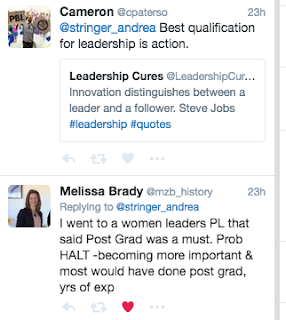Where do you gain or develop your skills and knowledge as a
leader? Recently asked what are the requirements for being a leader,
I spent the week thinking…
- Is it being accredited as Highly Accomplished or Lead teacher?
- Is it because you have a Masters in Leadership or Education?
- Is it based on your ‘acting’ experiences?
- Are you expected to have a certain number of years of teaching experience?
Accreditation
At Harvard, I learnt that
there is an accreditation process to become a principal in the US. I wondered about this accreditation process and the principals I knew in Australia. Does an accreditation process prepare you for leadership? In 2015, I became accredited as Experienced
Teacher (AIS) through the standards-based pathway. I viewed my evidence (programs, assessment, data, etc), aligned them to the standards, indicating that I
met the benchmark. I can honestly say that there was not much ‘learning’
taking place through this process. While I became more familiar with the Australian Teaching Standards, I was proving that my work met particular
standards. I didn’t create or research anything new but simply aligned my evidence to the standards.
Recently I spent a day learning how to use action research
as a pathway to Experienced
Teacher (ISTAA). After working on my PhD last year, I think I have a solid understanding of the process of action
research. I did learn how to use the digital portfolio and upload the evidence.
This was helpful but what resonated with me throughout the day was the learning
and growth that action research could provide. The learning happens throughout
the entire process. I worry that the standards-based accreditation is a
tick-the-box-process. The process is not focused on professional growth but
about proving that you are ‘proficient, experienced, accomplished, or a lead’
teacher. But the action research was
more about improving yourself through learning. It centred around learning to improve students' learning experiences. We listened to someone who went
through the process last year and he talked about it being messy, overwhelming
and at times, stressful. He also mentioned that he believes he learnt more
going through this path than aligning the standards with his evidence. I
learnt that if your action research is approved it will be credited towards a
Masters in Education. Yet the accreditation process does not recognise any previous
postgraduate study.
I have a Masters in Education but did not conduct a research
project. I wrote a 10, 000 word literature review, which was an enlightening professional experience. In hindsight, I wish I had completed a research project. I think it is unfortunate
that a teacher’s salary is solely based on accreditation and not professional and
personal growth. When you undertake postgraduate study or research,
your focus in on learning and improving. Accreditation is focused on proving
yourself. But I see the action research path differs.
Years of Experience
Does experience hold value in schools? If one is ‘acting’ in
the leadership role, does that reflect the school’s view of being appropriately
qualified or an appropriate substitute? Is there a set pathway to leadership? Is context a huge variable? I’ve
heard a second year teacher share how he wanted to be a principal. Only later to
hear others say that he needs to be in the classroom for at least 10 years
first. I asked someone (not in education), what he thought was a pre-requisite for being
an educational leader. He responded with, ‘wouldn’t someone with 20 years experience
in the classroom be a good indicator?’ Does an effective teacher make an
effective leader? I don’t believe these are synonymous. I once worked in an
industry where you worked your way up the ladder. Your years of experience
reflected your power in the workplace. When people became manager, they believed they had the right to have the best car space,
make all the decisions, and their requests were always the priority. I remember
my parents saying that it was character building and said it taught me to
respect those with more experience. I do respect those with more experience but in my opinion, leadership is not about power but empowering. I sought others' opinions about leadership on Twitter.
Twitter Poll
- the culture, the climate and the capacity of their team
- relationships and the self-efficacy of their team
- and establish trust
I don’t have the answers but sometimes it’s worth asking the question-
What are the best qualifications and skills required for leadership?
Always asking questions...
@stringer_andrea






